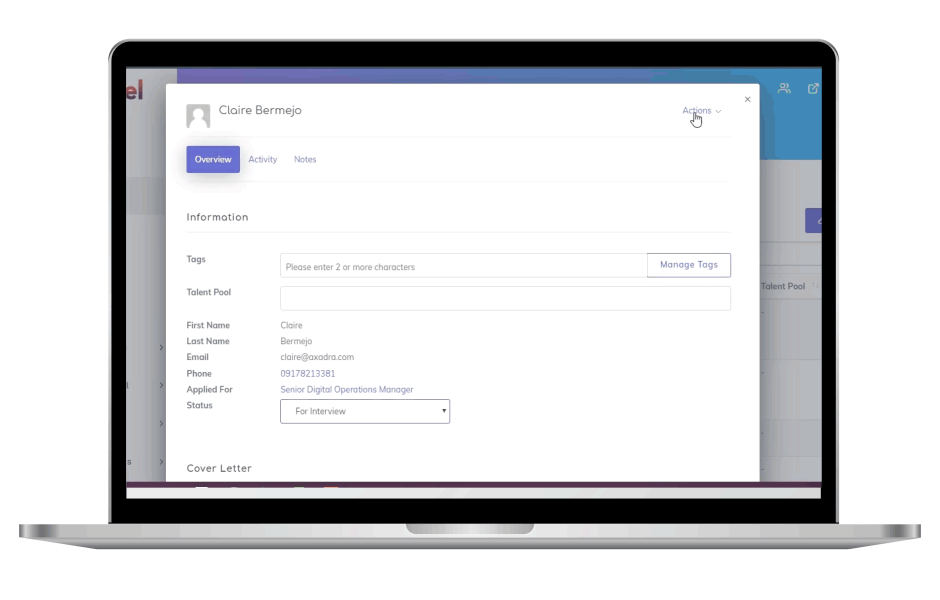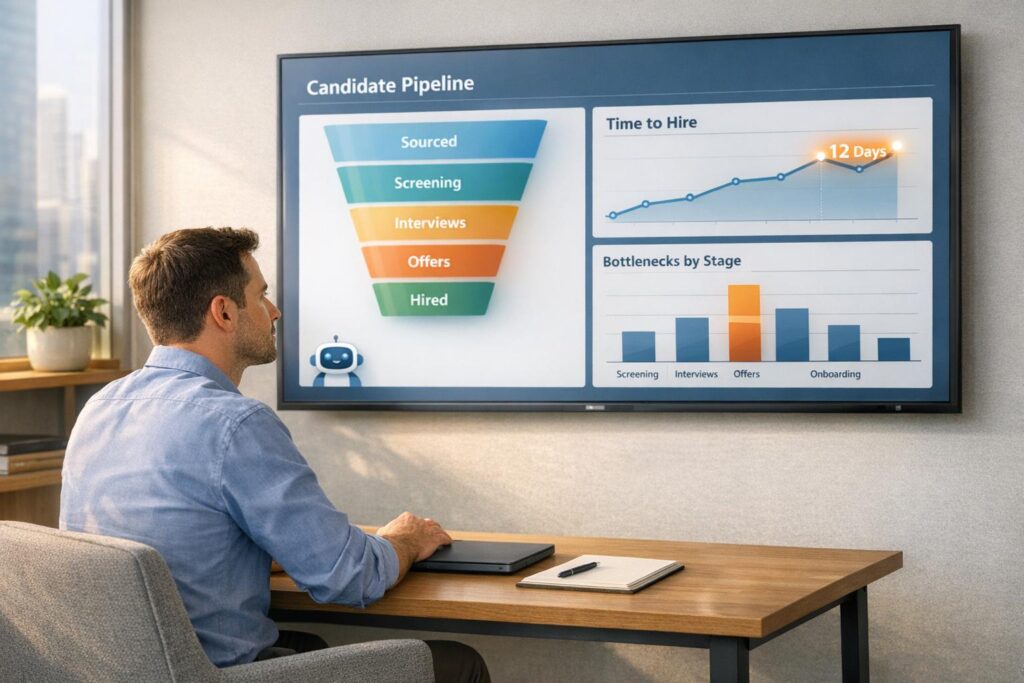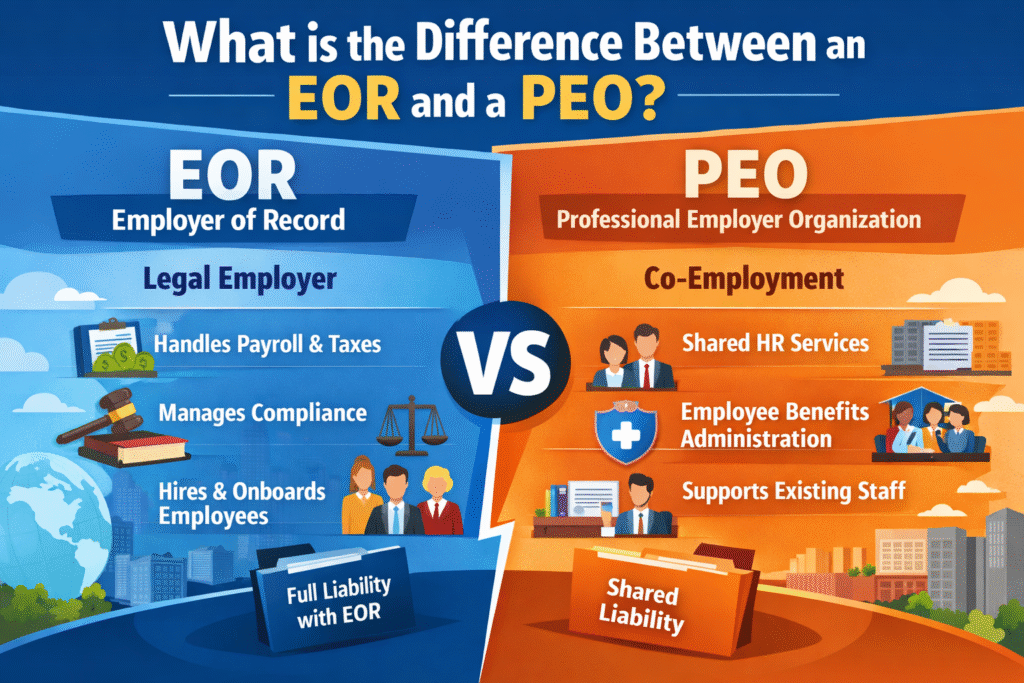In today’s interconnected world, the power of a mobile device extends far beyond just connecting us to loved ones or enabling seamless purchases. It’s a gateway to talent—transforming the recruitment landscape.
With the surge of mobile technology, job seekers can explore opportunities from anywhere, bridging geographical barriers. For recruiters, this means tapping into an expansive pool of talent without constraints.
Leveraging this mobile avenue isn’t merely an option—it’s a necessity. The ability to adapt and optimize mobile recruitment practices determines the difference between securing the best-suited candidate for a role and missing out on exceptional talent. Embracing mobile recruitment is no longer a choice but a strategic imperative.
In this article, we’ll discuss what is mobile hiring and the channels you can utilize. We’ll also talk about the various pros and cons of this approach, along with some tips to help you get started.
What is Mobile Hiring?
Mobile hiring refers to leveraging mobile technology in the recruitment process to engage and connect with potential job applicants. It encompasses the use of smartphones, tablets, and various applications to streamline and facilitate every stage of hiring. This method enables recruiters to reach a broader audience, providing candidates with the flexibility to search, apply, and communicate on the go.
Mobile talent recruitment integrates convenience and accessibility into the recruitment journey, allowing seamless interactions between recruiters and applicants. From job postings optimized for mobile viewing to utilizing messaging apps for swift communication, it embraces the modern workforce’s preference for mobile-centric experiences in the job search and application process.
Channels Used in Mobile Recruitment
In the realm of mobile hiring, diverse channels serve as gateways to connect with potential talent, revolutionizing how employers and job seekers interact in the hiring landscape. These channels harness the power of mobile technology to bridge the gap between recruiters and candidates, optimizing accessibility and engagement throughout the hiring process.
Job Search Platforms
Job search platforms have redefined recruitment strategies, offering mobile-friendly interfaces and comprehensive features. Candidates can navigate listings, submit applications, and engage with recruiters effortlessly through platforms like LinkedIn, Indeed, and Glassdoor.
Mobile Applications
Tailored mobile apps streamline the job search process. These applications provide user-friendly experiences, offering resume uploads, personalized job suggestions, and real-time notifications, enhancing efficiency for both recruiters and applicants.
Text Messaging
Text messaging emerges as a direct and immediate communication tool in mobile recruitment. Recruiters utilize texts for updates, interview scheduling, and initial screenings, leveraging the ubiquity of texting for convenient interactions.
Calls
Phone calls remain integral in mobile talent recruitment, facilitating preliminary discussions and in-depth interviews. Recruiters utilize calls to establish rapport and assess candidates’ suitability for various roles.
Social Media Platforms
Using social media in recruitment has been the trend lately. Platforms like Twitter, Facebook, and Instagram serve as avenues to showcase company culture, share job openings, and engage with potential candidates, tapping into vast networks to reach diverse talent pools.
Pros of Mobile Recruitment
Mobile recruitment presents a myriad of advantages revolutionizing the hiring landscape, amplifying connectivity, and streamlining processes for both recruiters and candidates alike.
Connectivity
Connectivity lies at the core of mobile hiring. It breaks geographical barriers, enabling seamless interaction between recruiters and potential hires and fostering a global talent pool. With smartphones as constant companions, the accessibility to connect transcends time zones and locations, ensuring constant engagement throughout the hiring process.
Flexibility
Flexibility defines mobile talent recruitment, allowing job seekers to explore opportunities at their convenience. Whether during a commute or a break, candidates can search for jobs, submit applications, and engage with recruiters anytime, anywhere, fitting job hunting seamlessly into their daily lives.
Convenience
The paramount factor of convenience characterizes mobile recruitment. Job postings optimized for mobile viewing and the user-friendly interfaces of recruitment platforms ensure a hassle-free experience for applicants, enhancing their engagement and interest in available positions.
Wider Reach
The utilization of mobile channels facilitates a wider reach for recruiters, tapping into a broader audience. This expanded reach ensures access to diverse talent pools, maximizing the possibility of finding the most suitable candidates for specific roles.
Time-Efficiency
Mobile recruitment’s efficiency speeds up hiring. Swift communication through texts or calls expedites interview scheduling and feedback, reducing the time from application to placement.
Cost-Effective
In addition, mobile hiring often proves cost-effective. By leveraging mobile platforms and apps, recruiters can reduce expenses related to traditional hiring methods, such as printing materials or advertising through non-digital channels.
Improved Candidate Experience
The emphasis on mobile recruitment enhances the candidate experience significantly. The ease of navigation, quick response times, and personalized interactions contribute to a positive candidate journey, fostering goodwill even for applicants who aren’t ultimately hired.
Cons of Mobile Recruitment
Despite its advantages, mobile recruitment presents certain drawbacks that warrant consideration in the hiring process.
Disengagement
This may arise due to the informal nature of mobile interactions. Candidates might perceive mobile communications as impersonal, potentially leading to disinterest or a lack of commitment in the recruitment process. Moreover, the convenience of mobile browsing might encourage superficial engagement, resulting in candidates applying for multiple roles without genuine interest, complicating the selection process for recruiters.
Incomplete Assessment
Incomplete assessment can be a challenge in mobile hiring. Limited screen sizes or interface constraints may hinder a comprehensive evaluation of candidates’ qualifications or skills. Additionally, reliance on mobile platforms might restrict the presentation of detailed resumes or portfolios, potentially affecting recruiters’ ability to gauge applicants accurately.
Mobile Recruitment Tips
Maximizing the potential of mobile talent recruitment involves strategic implementation and leveraging various tools to streamline the hiring process effectively. Here are some tips you can follow when starting with mobile recruitment:
Optimize Your Content for Mobile
Ensure that all recruitment-related content, including job postings, career pages, and application forms, is mobile-responsive. Simplify the application process for candidates using smartphones or tablets to encourage seamless interaction.
Create a Strong Social Media Presence
Establish an active and engaging presence on various social media platforms. Share compelling content about your company culture, job openings, and industry insights to attract and engage potential candidates.
Use Geo-Targeted Ads
Leverage geo-targeting capabilities in advertising to reach specific demographics or locations. Tailor your recruitment campaigns to target audiences where your ideal candidates are located.
Take Advantage of QR Technology
Integrate QR codes into your recruitment materials, such as flyers or advertisements, to provide quick access to job listings or application portals. Simplifying the application process via QR codes enhances candidate experience.
Utilize Mobile Job Search Apps
Explore and utilize mobile applications specialized in job hunting. These platforms increase visibility and accessibility, allowing candidates to explore opportunities conveniently on their mobile devices.
Conduct Video Interviews
Implement video interviews as part of your recruitment process to accommodate remote applicants. Video interviews enable a comprehensive assessment of candidates’ skills and suitability for the role.
Use Recruitment Marketing Automation Software
Employ automation tools to streamline repetitive tasks, manage candidate data efficiently, and enhance the overall effectiveness of your recruitment efforts. Recruitment marketing automation software can optimize workflows and improve engagement throughout the hiring process.
Start Reaching More Qualified Talents
Mobile recruitment is no longer a choice but a necessity in the dynamic landscape of talent acquisition. Leveraging the power of mobile technology transforms the hiring process, fostering connectivity, accessibility, and efficiency. Embracing these strategies ensures tapping into a vast pool of talent, driving success in today’s competitive job market.
















